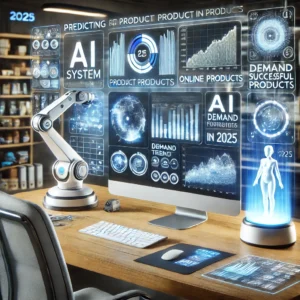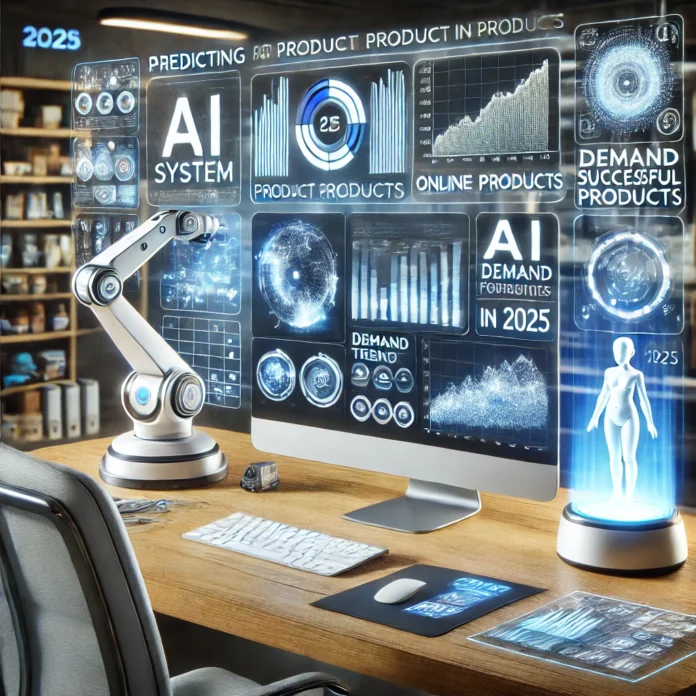 The digital landscape continues to evolve at a breathtaking pace, especially when we consider emerging trends in achieving online success. As we move closer to 2025, innovative AI systems are redefining how businesses approach product development and marketing strategies. One noteworthy trend is the rise of platforms designed to analyze consumer behavior and market needs, helping businesses generate money online in a smarter, more targeted manner.
The digital landscape continues to evolve at a breathtaking pace, especially when we consider emerging trends in achieving online success. As we move closer to 2025, innovative AI systems are redefining how businesses approach product development and marketing strategies. One noteworthy trend is the rise of platforms designed to analyze consumer behavior and market needs, helping businesses generate money online in a smarter, more targeted manner.
Websites harnessing the power of predictive analytics have become essential tools for entrepreneurs and small business owners aiming for online success. These platforms utilize sophisticated algorithms to sift through vast amounts of data, extracting valuable insights into customer preferences, buying patterns, and market shifts. For instance, imagine a budding e-commerce store that wishes to launch a new category of products. By leveraging these predictive AI systems, the store can identify the best products to introduce based on trending keywords, social media engagement, and even seasonal fluctuations.
“As we dive into 2025, the fusion of AI and market intelligence will take the guesswork out of predicting products.”
One of the most exciting components of these AI-driven platforms is their ability to track and predict the virality of products. By monitoring indicators such as social media buzz, search volume, and influencer collaborations, these systems can forecast which products are likely to soar to success before they even hit the shelves. It’s akin to having a crystal ball that tells you where to invest your time and resources for maximum return.
| Year | Growth in E-commerce | Predicted Usage of AI Systems |
|---|---|---|
| 2021 | 15% | 5% |
| 2022 | 18% | 10% |
| 2023 | 22% | 15% |
| 2025 | 30% (projected) | 30% (projected) |
This increasing reliance on AI systems for predicting products illuminates a crucial insight: the future of online business isn’t just about intuition; it’s becoming a discipline backed by data. Now more than ever, businesses need to embrace these tech-forward approaches or risk being left behind in the ever-competitive digital marketplace. As you ponder your own ventures, think about how incorporating AI insights could transform your business strategy and enhance your chances for future online success. What possibilities for innovation can you envision by harnessing this powerful technology?
Key features of predictive AI systems
To truly understand the transformative impact of AI systems on predicting successful products, it’s essential to explore their core features. These features not only enhance predictive accuracy but also streamline the processes that businesses must navigate to achieve online success. At the heart of many of these systems lies advanced data analytics, which unravels complex patterns and trends that a human analyst might miss. For instance, AI systems can analyze consumer sentiment from reviews and social media posts in real-time, enabling companies to stay ahead of changing preferences.
Another key feature is machine learning, which allows predictive models to evolve over time. As these systems process more data, they improve their predictive capabilities, creating a feedback loop that leads to increasingly accurate forecasts. Imagine a startup that sells sustainable products. By utilizing these systems, they can adapt their offerings based on shifting consumer sentiments toward eco-friendly choices, thus ensuring their relevance in a rapidly changing marketplace.
Furthermore, many AI-driven platforms offer user-friendly dashboards that visualize complex data for easy interpretation. These dashboards often highlight trends through graphs and charts, making it simpler for entrepreneurs to grasp the state of their market at a glance. This accessibility empowers business owners with actionable insights that can inform product development and marketing strategies without requiring data science expertise.
Additionally, predictive AI systems frequently incorporate competitive analysis features. These tools assess competitors’ offerings, pricing, and promotional strategies, enabling businesses to position themselves effectively within the market. It’s akin to having a scout on the competitive battlefield who can advise you on the best strategies to outmaneuver rivals. As the e-commerce realm grows, understanding competition becomes an essential ingredient for triumph.
One exciting aspect of these systems is the incorporation of natural language processing (NLP), which allows them to gauge consumer reactions across various platforms efficiently. By analyzing conversations and feedback in a multitude of forums, organizations can tap into the nuanced preferences of their target demographics. This ensures that they don’t just create products; they create products that resonate.
The profound element here is how these features contribute to agility in product development. With predictive insights at their fingertips, businesses can experiment with new ideas, refine existing products, and pivot quickly when they notice a trend gaining traction. This technological agility becomes a significant competitive advantage as we approach 2025, where the digital marketplace will be more dynamic than ever before.
As you reflect on these powerful AI systems, consider how integrating their capabilities into your own operations could reshape your approach to predicting products. What opportunities might arise if you could harness the immense potential of AI in your journey toward online success?
Case studies of AI-driven product predictions
In the realm of AI-driven product predictions, the impact of predictive analytics has manifested in various case studies showcasing successful implementations. One notable example comes from a popular online marketplace that employed AI systems to forecast the success of new product launches. By analyzing historical sales data alongside current web traffic and social media mentions, this marketplace identified a rising trend in eco-friendly home products. The predictive analytics indicated a 75% probability of success for their eco-friendly line, leading to a targeted marketing strategy that resulted in sales exceeding initial projections by 40% once the products were launched.
Another compelling case study involves a fashion retailer that struggled to keep up with fast-changing consumer preferences. By utilizing advanced machine learning algorithms, the retailer was able to predict which styles would gain traction based on trend-relevant data from influencers and social media. The AI system highlighted a burgeoning interest in vintage clothing, prompting the retailer to adjust their inventory accordingly. As a result, sales in the vintage category surged by an astonishing 150%, illustrating the transformative power of data-driven decision-making.
A tech startup focused on gadgets also leveraged predictive analytics to determine the most desirable features for their upcoming product line. They engaged with a predictive AI platform that analyzed customer reviews across multiple e-commerce sites. The system revealed a strong preference for connectivity and sustainability in tech gadgets, granting the startup crucial insights into consumer desires. By aligning their product development with these preferences, the startup was able to carve out a niche in the competitive market, achieving a significant boost in customer satisfaction and loyalty.
An emerging trend is also evident in the domain of food delivery services. A popular app for ordering meals began using AI systems to predict popular dining trends based on time of year, consumer feedback, and cuisine preferences. The system flagged sushi as a growing trend during spring months. As a response, the service optimized its offerings, boasting a 200% increase in sushi-related orders during that period alone. Such forecasts not only drove revenue but also empowered local sushi restaurants, making it a win-win scenario for all parties involved.
These case studies collectively emphasize the core value of integrating AI-driven predictive systems into business operations. They highlight how AI systems facilitate informed decision-making, allowing businesses to be proactive in tailoring their offerings to what consumers truly want. As the web continues to evolve, the lessons gleaned from these examples should inspire other entrepreneurs to harness the potential of predictive analytics in their quest for online success.
As you digest these fascinating illustrations, consider how embracing similar strategies could propel your own ventures. The question to ask yourself now is not just what products you could sell but how deep insights could drive your business decisions. With the robust capabilities of AI at your disposal, the future appears bright for those ready to innovate.

